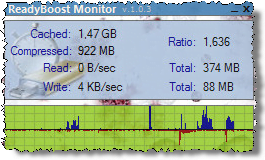

Also, if you later decide you want it to launch at startup, you can just return to this area of the Task Manager, right-click the application and select “Enable.” IDG To stop a program or service from launching at startup, right-click it and select “Disable.” This doesn't disable the program entirely it only prevents it from launching at startup - you can always run the application after launch.
TURN ON READYBOOST WINDOWS 10 WINDOWS 10
Included on the list is each program's name as well as its publisher, whether it's enabled to run on startup, and its “Startup impact,” which is how much it slows down Windows 10 when the system starts up. You'll see a list of the programs and services that launch when you start Windows. There's plenty you can do with it, but we're going to focus only on killing unnecessary programs that run at startup.Ĭlick the Startup tab. The Task Manager will then appear in all of its full-tabbed glory. If the Task Manager launches as a compact app with no tabs, click “More details” at the bottom of your screen.

Start by launching the Task Manager: Press Ctrl-Shift-Esc, right-click the lower-right corner of your screen and select Task Manager, or type task manager into the Windows 10 search box and press Enter.
TURN ON READYBOOST WINDOWS 10 PC
Stop them from running, and your PC will run more smoothly. One reason your Windows 10 PC may feel sluggish is that you’ve got too many programs running in the background - programs that you rarely or never use. Desktop users have no reason to choose “Power saver,” and even laptop users should consider the “Balanced” option when unplugged - and “High performance” when connected to a power source. “High performance” gives you the most oomph, but uses the most power “Balanced” finds a happy medium between power use and better performance and “Power saver” does everything it can to give you as much battery life as possible. To change your power setting, simply choose the one you want, then exit Control Panel. You’ll typically see two options: “Balanced (recommended)” and “Power saver." (Depending on your make and model, you might see other plans here as well, including some branded by the manufacturer.) To see the “High performance” setting, click the down arrow by “Show additional plans.” IDGĬhange your power settings in Control Panel to give your PC a performance boost. To do it, launch the Control Panel app, then select Hardware and Sound > Power Options.


 0 kommentar(er)
0 kommentar(er)
